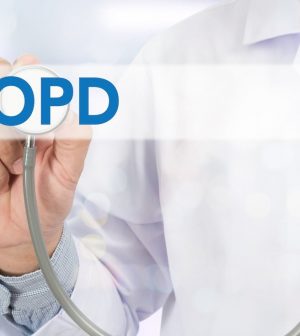- Could Your Grocery Store Meat Be Causing Recurring UTIs?
- Are You Making This Expensive Thermostat Error This Winter?
- Recognizing the Signs of Hypothyroidism
- 10 Strategies to Overcome Insomnia
- Could Artificial Sweeteners Be Aging the Brain Faster?
- Techniques for Soothing Your Nervous System
- Does the Water in Your House Smell Funny? Here’s Why
- Can a Daily Dose of Apple Cider Vinegar Actually Aid Weight Loss?
- 6 Health Beverages That Can Actually Spike Your Blood Sugar
- Treatment Options for Social Anxiety Disorder
Voice Changes Warn of COPD Flare-Ups

A flare-up in COPD can be predicted through changes in a person’s voice, a new study claims.
Patients’ voices become higher-pitched, more breathy or hoarse when a flare-up is imminent, researchers found.
Using those cues, researchers are working on a smartphone app that could help people prepare for an exacerbation of their COPD.
“If we are able to do this, it would pave the way for early detection and diagnosis of exacerbations in the home environment,” said investigator Loes van Bemmel, a researcher in respiratory medicine with Maastricht University Medical Cetner in the Netherlands. “This would enable patients to manage these events themselves at home.”
Chronic obstructive pulmonary disease (COPD) is a group of lung diseases that include emphysema and chronic bronchitis. COPD prevents airflow to the lungs, causing sufferers to struggle to breathe.
Flare-ups in COPD symptoms can lead to hospitalization and an increased risk of death, unless people are treated early in an exacerbation, researchers said.
For the study, researchers asked 28 COPD patients to record their voices using a smartphone app every day for 12 weeks.
The recorded themselves saying “aah” for as long as they could manage in one breath, and then read either a short paragraph from a story or answered a question.
The participants also completed a daily questionnaire regarding their COPD symptoms, including 16 occasions when a patient experienced a flare-up.
Researchers analyzed the voice recordings and looked for changes that coincided with symptom flare-ups.
They found patients’ voices became higher-pitched on the verge of a flare-up. They also discovered more “jitter” — a breathy or hoarse tone — in voices when an exacerbation is imminent.
“There were clear differences between patients’ recordings on a normal day and on the first day of an exacerbation,” van Bemmel said. “This confirmed our hypothesis that speech changes significantly, even at the very beginning of an exacerbation.”
These results need to be confirmed in larger numbers of patients with COPD, but researchers are already planning to translate their findings into an app that would help patients better manage their breathing problems.
“While every disease is different, speech analysis could potentially help in other respiratory diseases as well,” van Bemmel said. “We suspect there are speech biomarkers for many respiratory diseases.”
Researchers presented their findings Tuesday at the European Respiratory Society (ERS) annual meeting in Vienna. Such findings should be considered preliminary until published in a peer-reviewed journal.
Secretary of the ERS meeting Fritz Franssen noted that catching a COPD flare-up early is important.
“When symptoms flare up, it can lead to a long-term deterioration in health and can even be fatal. If we spot these exacerbations early and give treatment, we know that serious complications can often be averted,” Franssen, head of respiratory medicine at the Maastricht University Medical Center, said in a meeting news release.
“If it can be validated, this could lead to a quick and efficient system to alert a patient and their doctor that treatment is needed,” added Franssen, who was not involved in the study. “Because it works via a smartphone, voice analysis could be used by anyone, at anytime and anywhere. This could ultimately save money, time and patients’ lives.”
More information
The U.S. Centers for Disease Control and Prevention has more about COPD.
SOURCE: European Respiratory Society, news release, Sept. 10, 2024
Source: HealthDay
Copyright © 2026 HealthDay. All rights reserved.










